Hiring talent for tech-oriented companies: Get creative
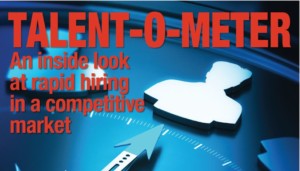
These are challenging times to hire talent for tech-oriented companies in the Americas. Business is growing fast, and competition is stiff for employees who can be agile in a quickly changing marketplace.
Mariana Ortiz de Zarate, pictured above, knows the challenge. Her job this year includes hiring about two people per week for Rockwell Automation’s control products and solutions division for Latin America. Those recruits need to keep sales for her business unit climbing at the double-digit pace of recent years.
To succeed, Ortiz de Zarate said she’s looking at new tests to evaluate candidates. And she’s working with existing staff to master new skills and move up the ranks, a policy that rewards agility.
She’s especially keen on talent with both engineering and sales skills, an uncommon mix but one vital for a business that increasingly develops tech systems and not only sells products.
Ortiz de Zarate shared her insights at HR Connections on Jan. 16 in talks that also touched on managing Millennials, reverse mentoring and how HR can make businesses more creative.
“People are looking for more work-life balance, so that makes it harder for HR,” Zarate conceded.
From selling products to selling services
Ortiz de Zarate works with a Milwaukee-based company that had $6.62 billion in sales and 22,500 employees in 80 countries in fiscal 2014. Her division makes products and systems to automate factories in multiple locations.
Where do you see the biggest growth in Latin America coming from?, asked Marjorie Kean, a managing director in Miami with retained executive search firm Executive Search.
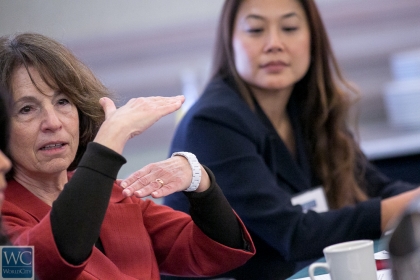
Marjorie Kean, left, a managing director in Miami with retained executive search firm Executive Search. Photos by Carlos Miller
The big opportunity lies in selling services and solutions, not just products in boxes, said Ortiz de Zarate, echoing the strategy underway at Caterpillar, IBM and other big industrial companies shifting more to value-added services.
Many customers now want to buy in a different way, said Ortiz de Zarate. Instead of choosing specific products and developing their own systems in-house, they want to asking Rockwell to develop their systems, saying: “You figure it out, and you make my plant run better.”
That means sales teams increasingly need both engineering and sales skills. But participants in HR Connections agreed that typically, sales staff don’t know engineering nor engineers know the art of closing a deal.
One solution, Ortiz de Zarate has found, is teaming up long-time sales staff with engineers on customer calls, so they can combine their strengths.
Rockwell also is grooming young engineers in sales, since they tend to be more open than the older generations to master the sales ropes – a step generally needed to move up in Rockwell’s organization, Ortiz de Zarate said. About 70 percent of her unit’s hiring is internal, said the senior HR manager.
Is there a particular skill hard to find for talent in Latin America, such as negotiating? asked Francia Baez Guzman, managing partner of human resources specialists FBG Consulting.
What’s tough is finding talent with hefty “intellectual horsepower,” who can process lots of information and then, apply it to real-word situations, said Ortiz de Zarate.
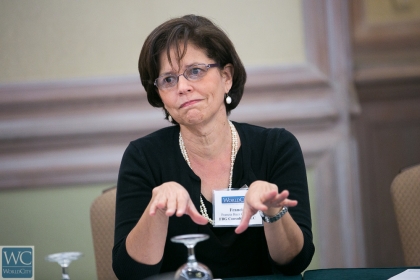
Francia Baez Guzman, managing partner of human resources specialists FBG Consulting.
Indeed, new tests for job candidates aim to examine a broader range of skills, personality traits and even how well people process information, she said.
Managing Millennials: Mentoring and reverse mentoring
As you evolve into more of a tech company, how do you manage tensions between generations? asked Ricardo Ramirez, HR director for the Caribbean and Central America for PepsiCo.
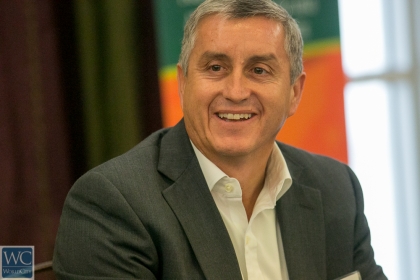
Ricardo Ramirez, HR director for the Caribbean and Central America for PepsiCo.
If you have good managers willing to teach and coach, said Ortiz de Zarate, “you’re off the hook.”
At Rockwell, one long-time engineer offered to help newer staff, and that experience developed into a mentoring program. Mentoring helps more experienced employees feel important and newer ones to catch on faster, said Ortiz de Zarate.
Reverse mentoring also can work, where younger employees train senior managers in social media and other skills and share the concerns of younger employees, said Olivier Bouclier, associate dean for executive education and graduate business programs at the University of Miami.
“But sometimes, the boss is not the old guy. It’s the young guy,” said PepsiCo’s Ramirez, noting some younger managers in Latin America view colleagues over 50 as incapable of doing the job. “You need to make sure all the generations are in the same boat and playing on the same page.”
Older generations had tended to think more like the “good soldier” and do what the company wanted, such as moving every few years or traveling most of the time, said Lorena Keough, a managing director at Diversified Search.
Millennials in contrast are more likely to push back. That’s why it’s more important than ever for HR to communicate clearly what’s required for a job – such as the amount of travel, said Keough.
Yet challenges from Millennials can help companies innovate, said Isabel Montes, HR manager for Latin America for Starbucks Coffee Company. Younger employees might ask, for example, “Do I really need to travel that much, when I can do video conferencing?”
Some HR departments are becoming more innovative to lure talent. Food giant Nestle, for instance, tries to secure jobs in Switzerland for spouses of staff relocating to its corporate headquarters, recognizing that many top performers have partners with their own careers, said Montes.
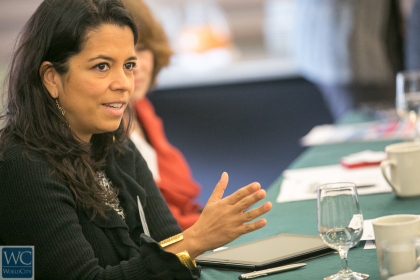
Isabel Montes, HR manager for Latin America for Starbucks Coffee Company.
The challenge, said Montes, is “How in HR can we influence the business to become more creative?”
HR Connections is one of five event series organized by media company WorldCity to bring together executives on international business topics. The HR series is sponsored by Diversified Search, the University of Miami School of Business Administration and employment law firm Littler Global.
The next HR Connections is set for March 13.